Hyundai i30 vs VW Passat – Differences & prices compared
Both models have their strengths – but which one suits you more?
Compare performance, efficiency, price and space directly: Hyundai i30 or VW Passat?
Costs and Efficiency:
When it comes to price and running costs, the biggest differences usually appear. This is often where you see which car fits your budget better in the long run.
Hyundai i30 has a significantly advantage in terms of price – it starts at 24000 £, while the VW Passat costs 35700 £. That’s a price difference of around 11743 £.
Fuel consumption also shows a difference: VW Passat manages with 0.30 L and is therefore decisively more efficient than the Hyundai i30 with 5.70 L. The difference is about 5.40 L per 100 km.
Engine and Performance:
Power, torque and acceleration say a lot about how a car feels on the road. This is where you see which model delivers more driving dynamics.
When it comes to engine power, the VW Passat has a clearly edge – offering 272 HP compared to 140 HP. That’s roughly 132 HP more horsepower.
In acceleration from 0 to 100 km/h, the VW Passat is convincingly quicker – completing the sprint in 5.80 s, while the Hyundai i30 takes 9.60 s. That’s about 3.80 s faster.
In terms of top speed, the VW Passat performs noticeable better – reaching 250 km/h, while the Hyundai i30 tops out at 197 km/h. The difference is around 53 km/h.
There’s also a difference in torque: VW Passat pulls noticeable stronger with 400 Nm compared to 253 Nm. That’s about 147 Nm difference.
Space and Everyday Use:
Whether family car or daily driver – which one offers more room, flexibility and comfort?
Both vehicles offer seating for 5 people.
In curb weight, Hyundai i30 is distinct lighter – 1291 kg compared to 1573 kg. The difference is around 282 kg.
In terms of boot space, the VW Passat offers significantly more room – 690 L compared to 395 L. That’s a difference of about 295 L.
In maximum load capacity, the VW Passat performs evident better – up to 1920 L, which is about 619 L more than the Hyundai i30.
When it comes to payload, VW Passat slightly takes the win – 577 kg compared to 509 kg. That’s a difference of about 68 kg.
Who comes out on top?
Overall, the VW Passat shows itself to be is largely superior and secures the title of DriveDuel Champion.
It convinces with the more balanced overall package and proves to be the more versatile choice for everyday use.
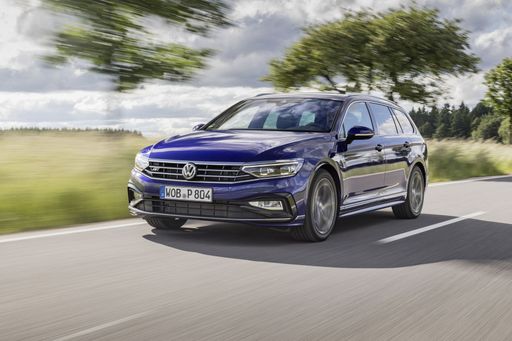
VW Passat
Hyundai i30
The Hyundai i30 stands out in the hatchback segment with its sleek design and modern features. It offers a comfortable ride with a well-crafted interior that caters to both driver and passengers. With its emphasis on safety and technology, the i30 provides a balanced driving experience suitable for urban and suburban environments.
details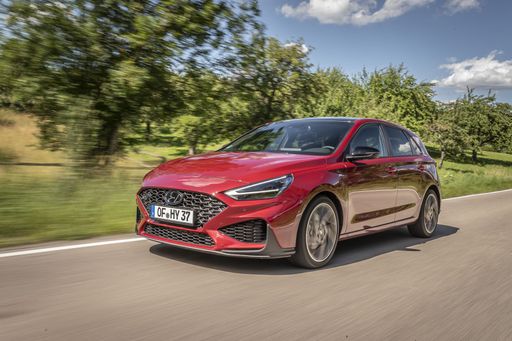 @ hyundai.news
@ hyundai.news
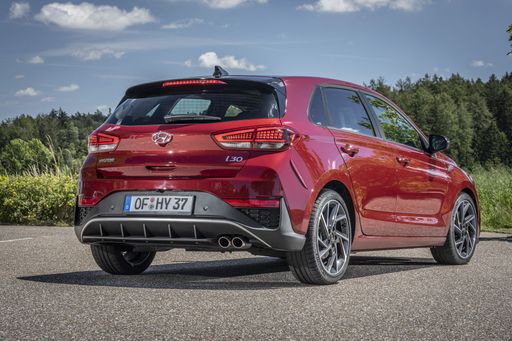 @ hyundai.news
@ hyundai.news
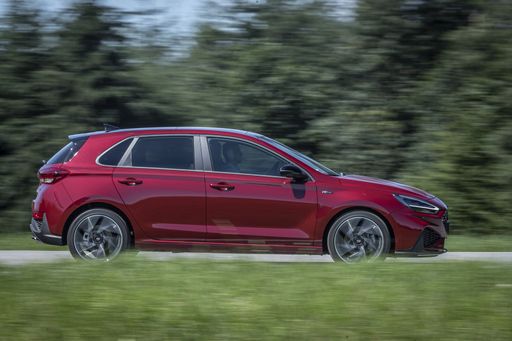 @ hyundai.news
@ hyundai.news
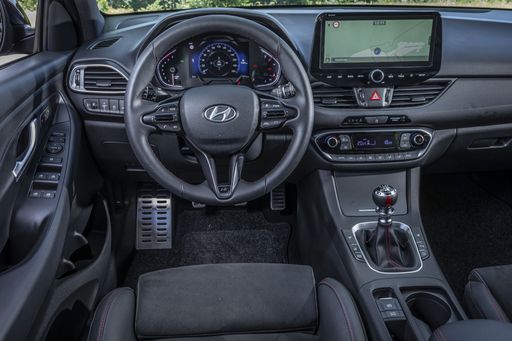 @ hyundai.news
@ hyundai.news
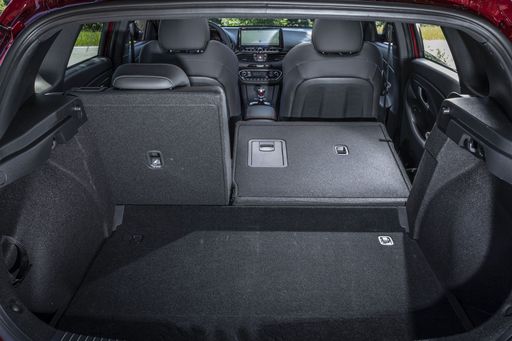 @ hyundai.news
@ hyundai.news
VW Passat
The VW Passat is a staple in the family saloon segment, known for its refined design and practicality. It effortlessly combines a comfortable ride with a spacious interior, making it a popular choice for long journeys. The cabin features high-quality materials and an intuitive infotainment system, providing a premium feel without sacrificing user-friendliness.
details @ volkswagen-newsroom.com
@ volkswagen-newsroom.com
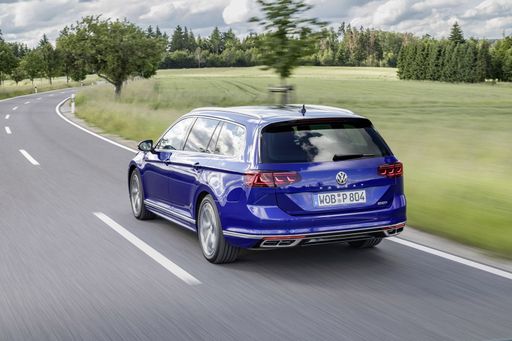 @ volkswagen-newsroom.com
@ volkswagen-newsroom.com
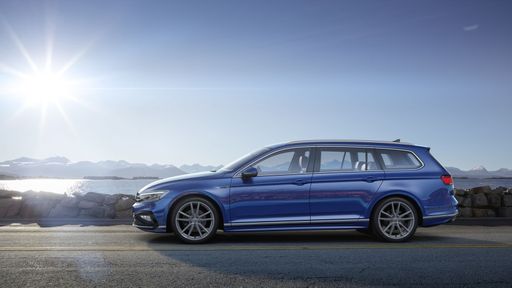 @ volkswagen-newsroom.com
@ volkswagen-newsroom.com
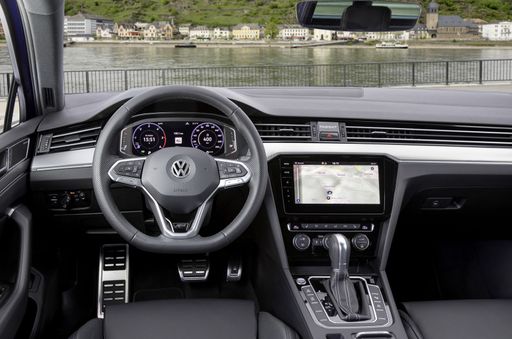 @ volkswagen-newsroom.com
@ volkswagen-newsroom.com

|

|
|
|
|
Costs and Consumption |
|
|---|---|
|
Price
24000 - 29300 £
|
Price
35700 - 58500 £
|
|
Consumption L/100km
5.7 - 6 L
|
Consumption L/100km
0.3 - 8 L
|
|
Consumption kWh/100km
-
|
Consumption kWh/100km
-
|
|
Electric Range
-
|
Electric Range
124 - 133 km
|
|
Battery Capacity
-
|
Battery Capacity
19.70 kWh
|
|
co2
130 - 136 g/km
|
co2
7 - 181 g/km
|
|
Fuel tank capacity
50 L
|
Fuel tank capacity
45 - 66 L
|
Dimensions and Body |
|
|---|---|
|
Body Type
Hatchback
|
Body Type
Estate
|
|
Seats
5
|
Seats
5
|
|
Doors
5
|
Doors
5
|
|
Curb weight
1291 - 1407 kg
|
Curb weight
1573 - 1858 kg
|
|
Trunk capacity
395 L
|
Trunk capacity
510 - 690 L
|
|
Length
4340 mm
|
Length
4917 mm
|
|
Width
1795 mm
|
Width
1849 mm
|
|
Height
1455 mm
|
Height
1521 mm
|
|
Max trunk capacity
1301 L
|
Max trunk capacity
1770 - 1920 L
|
|
Payload
463 - 509 kg
|
Payload
501 - 577 kg
|
Engine and Performance |
|
|---|---|
|
Engine Type
Petrol, Petrol MHEV
|
Engine Type
Plugin Hybrid, Petrol, Petrol MHEV, Diesel
|
|
Transmission
Manuel, Automatic
|
Transmission
Automatic
|
|
Transmission Detail
Manual Gearbox, Dual-Clutch Automatic
|
Transmission Detail
Dual-Clutch Automatic
|
|
Drive Type
Front-Wheel Drive
|
Drive Type
Front-Wheel Drive, All-Wheel Drive
|
|
Power HP
100 - 140 HP
|
Power HP
122 - 272 HP
|
|
Acceleration 0-100km/h
9.6 - 13.1 s
|
Acceleration 0-100km/h
5.8 - 10.7 s
|
|
Max Speed
178 - 197 km/h
|
Max Speed
212 - 250 km/h
|
|
Torque
172 - 253 Nm
|
Torque
250 - 400 Nm
|
|
Number of Cylinders
3 - 4
|
Number of Cylinders
4
|
|
Power kW
74 - 103 kW
|
Power kW
90 - 200 kW
|
|
Engine capacity
998 - 1482 cm3
|
Engine capacity
1498 - 1984 cm3
|
General |
|
|---|---|
|
Model Year
2024
|
Model Year
2024 - 2025
|
|
CO2 Efficiency Class
D, E
|
CO2 Efficiency Class
B, G, D, E
|
|
Brand
Hyundai
|
Brand
VW
|
What drive types are available for the Hyundai i30?
Available configurations include Front-Wheel Drive.
The prices and data displayed are estimates based on German list prices and may vary by country. This information is not legally binding.
